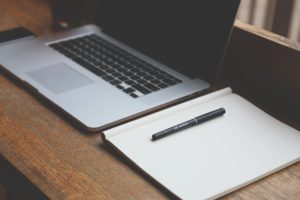Over the past few years, Dr Nick Bell has given previous accounts of life as a self-employed health and safety consultant. September 1 marks his fifth year ‘out on his own’.
 “It’s a bit of a fib when I say I’ve been self-employed for five years. I retreated to full time employment for a few months in 2018 after being diagnosed with a brain tumour and prescribed a dose of radiotherapy. With warnings of potentially dire outcomes, I didn’t want to be on my feet all day and travelling across the UK. My desire for relative calm was compounded by my need to finish my PhD. A full-time position offered me a bolt hole.
“It’s a bit of a fib when I say I’ve been self-employed for five years. I retreated to full time employment for a few months in 2018 after being diagnosed with a brain tumour and prescribed a dose of radiotherapy. With warnings of potentially dire outcomes, I didn’t want to be on my feet all day and travelling across the UK. My desire for relative calm was compounded by my need to finish my PhD. A full-time position offered me a bolt hole.
“I now have the all-clear (although lost hearing in one ear, which means I sometimes struggle as a trainer). During this period, with the blessing of my employer, I used my leave to deliver services to key clients, meaning that I didn’t ‘start from scratch’ when I eventually returned to self-employment.
“The experience taught me a few lessons. Life happens and self-employed folk need safety nets. I had insurance in place to cover basic living expenses, which would kick in if I had been left unable to work. The self-employed probably have a slightly greater need for financial reserves.
“The other lesson came on day two of full-time employment. I was driving to the same office, parking in the same spot, walking up the same stairs to sit at the same desk. The rhythm and familiarity gave me the calm that I was looking for. It was, however, rather bland compared to the technicolour existence of self-employment.
“I’m fortunate to be advising global organisations and some interesting assignments over the past year include:
- An audit of a project to explosively demolish a huge industrial building;
- Training a company building offshore windfarms;
- A trip to Germany to audit some manufacturing companies and being gob-smacked at how calm and well-organised they are.
“It’s possible, I have found, to become slightly addicted to the adrenalin rush of self-employment and wonder why the rest of the world moves in slow motion. I’m still learning how to make time to reflect and recharge.
“People sometimes suggest that I could take on additional staff, but my answer remains the same. I would rather do the work that I thoroughly enjoy rather than managing staff and a mass of associated paperwork.”
Worker wellbeing and engagement
 “Despite the trials and tribulations, I completed my PhD in 2018 and was then accepted as a Chartered Psychologist by the British Psychological Society. One of many highlights was being invited by the Belarussian Academy of Science to speak in Minsk. Self-employment, and an understanding spouse, allowed me to balance work and studies. In December 2018 I proposed that health and safety professionals might consider completing a Masters’ degree. This could be particularly true for self-employed consultants to increase your knowledge, confidence and credibility.
“Despite the trials and tribulations, I completed my PhD in 2018 and was then accepted as a Chartered Psychologist by the British Psychological Society. One of many highlights was being invited by the Belarussian Academy of Science to speak in Minsk. Self-employment, and an understanding spouse, allowed me to balance work and studies. In December 2018 I proposed that health and safety professionals might consider completing a Masters’ degree. This could be particularly true for self-employed consultants to increase your knowledge, confidence and credibility.
“Worker wellbeing and engagement (the subject of my PhD) now has equal place in my heart and mind to CDM. The self-employed have considerable freedom to shape their careers and pursue different paths.
“I have also learned lessons about what opportunities not to pursue, making me much better at sifting requests for support (I am, however, fortunate that I still do not need to actively look for work so can afford not to follow every lead).
“I have been the health and safety consultant/advisor for a few teams responding to formal tenders for large projects or frameworks. It has proven more hassle than it’s worth and I won’t be doing this in future. A huge amount of effort needs to go into preparing detailed responses (sometimes to rather bizarre questions!), preparing for and attending interviews and holding dates in the diary in the off chance the tender succeeds.
“While I relish doing more strategic support for construction projects (such as audits or helping get processes in place), I no longer provide hands-on/day-to-day support. These projects move at incredibly high speed and, despite my best efforts, often become quite reactive meaning that some meetings are called at the last minute, there’s a sudden need for an inspection etc. Trying to balance that with the rest of my work, such as training, which is often planned weeks and months in advance has proven impossible.
“I have learned that some people exist in a state of random panic. As clients, they probably need support more than calm, organised folk but can be difficult to work with as vital information cannot be found and deadlines are missed as they are more comfortable fire-fighting. It’s possible to quickly get a sense of how clients work and whether you have the energy and time to manage them as well as the work that needs completing.
“If you choose to go it alone, best of luck and I would love to hear how you get on.”
The Safety Conversation Podcast: Listen now!
The Safety Conversation with SHP (previously the Safety and Health Podcast) aims to bring you the latest news, insights and legislation updates in the form of interviews, discussions and panel debates from leading figures within the profession.
Find us on Apple Podcasts, Spotify and Google Podcasts, subscribe and join the conversation today!

 “It’s a bit of a fib when I say I’ve been self-employed for five years. I retreated to full time employment for a few months in 2018 after being diagnosed with a brain tumour and prescribed a dose of radiotherapy. With warnings of potentially dire outcomes, I didn’t want to be on my feet all day and travelling across the UK. My desire for relative calm was compounded by my need to finish my PhD. A full-time position offered me a bolt hole.
“It’s a bit of a fib when I say I’ve been self-employed for five years. I retreated to full time employment for a few months in 2018 after being diagnosed with a brain tumour and prescribed a dose of radiotherapy. With warnings of potentially dire outcomes, I didn’t want to be on my feet all day and travelling across the UK. My desire for relative calm was compounded by my need to finish my PhD. A full-time position offered me a bolt hole. “Despite the trials and tribulations, I completed my PhD in 2018 and was then accepted as a Chartered Psychologist by the British Psychological Society. One of many highlights was being invited by the Belarussian Academy of Science to speak in Minsk. Self-employment, and an understanding spouse, allowed me to balance work and studies. In December 2018 I proposed that
“Despite the trials and tribulations, I completed my PhD in 2018 and was then accepted as a Chartered Psychologist by the British Psychological Society. One of many highlights was being invited by the Belarussian Academy of Science to speak in Minsk. Self-employment, and an understanding spouse, allowed me to balance work and studies. In December 2018 I proposed that 
Whether employed or self-employed in the digital age, health has become a critical factor in being able to sustain reasonably “optimal performance over time” as, the stressors of work/life in the 21st Century compound the hazards and risks threatening individuals capacity to maintain productivity individually and/or collectively in the workplace. And, whether part of a peer group or individually, without actively working toward “Self-Preservation” the likely-hood of both your working life-cycle and income stream being seriously interrupted by ill-health, or even ended, cannot be ignored as, by the immediacy of a, so called, accident or longer latency of a non-communicable… Read more »